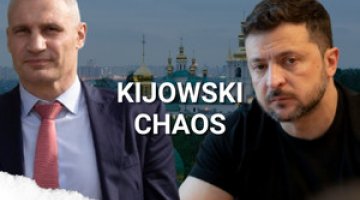A trial of strength in Ukrainian politics after the head of the special services resigns
On 18 June, at the request of President Petro Poroshenko, the Ukrainian parliament dismissed Valentyn Nalyvaichenko, the head of the Security Service of Ukraine (SBU). This unexpected dismissal was the result of his growing independence in running the SBU, and also a possible conflict between the ruling camp and the oligarch Dmytro Firtash, with whom Nalyvaichenko is linked. The sacking revealed a new dispute within the ruling camp, and reminds us that there is a rivalry in Ukraine between the government and the oligarchic circles which control the energy sector. At stake in the current conflict is the future of the Petro Poroshenko Bloc (BPP), which includes the UDAR party, within which Firtash still retains influence. In view of the upcoming local elections (at the end of October) and weakening support for the main forces of the coalition government, Poroshenko wants to create a strong, unified pro-presidential party. Meanwhile, Firtash is seeking either to maintain the ‘federal’ character of the BPP, or to remove UDAR from it.
Nalyvaichenko’s dismissal
The Security Service of Ukraine (SBU) is formally subordinate to the President alone, and is one of his main political tools. For the time being, Poroshenko has named the loyal Ihor Hrytsak as acting head of the SBU; according to media reports, Hrytsak had previously been head of Poroshenko’s personal guard. However, the price for removing Nalyvaichenko may turn out to be high. A new player has appeared on the political scene, who will be more likely to side with the opponents of the president and government, and who may play an important role in the campaign for October’s local elections, which is getting under way. Nalyvaichenko has already announced that he will enter politics, although for the time being he has not said which party he will associate himself with. He may join the leadership of UDAR (he was a deputy for the party in 2012-2014); turn to one of the political projects of Ihor Kolomoyski, currently the most powerful Ukrainian oligarch; or (although this seems least likely) start forming his own party . We must also remember that over the past two years Nalyvaichenko has been collecting information about corruption scandals, knowledge which could be valuable in his political manoeuvring.
Firtash’s conflict with Poroshenko
In late April, during a hearing in a Vienna court on his extradition to the US, Dmytro Firtash, one of the major Ukrainian oligarchs, confirmed earlier media reports of a formal agreement concluded at his initiative in spring 2014 between Petro Poroshenko and Vitali Klitschko, the leader of UDAR. Under this agreement Klitschko gave up on his own presidential ambitions, in exchange for which Poroshenko guaranteed him his support in elections to the post of mayor of Kyiv. The agreement also covered the distribution of numerous state posts, including Nalyvaichenko retaining his position as head of the SBU.
The disclosure of this confidential agreement, whose existence Poroshenko has publicly denied on several occasions, marked the final break between Firtash and the president. In mid-June Firtash, acting as chairman of the Federation of Employers of Ukraine, openly attacked the government, demanding its reconstruction (primarily the resignation of Prime Minister Arseniy Yatsenyuk), and suggesting the need for early parliamentary elections.
Poroshenko, who along with Yatsenyuk had already effectively weakened Firtash’s influence on the Ukrainian economy, took up the challenge: his reaction to the disclosure of the 2014 agreement was to push through a law concerning the gas market which struck at Firtash’s interests, and sacked Nalyvaichenko in response to the demand to hold early elections. In this way, however, he called into question the unity of the BPP, of which UDAR is an important component.
The pre-election context
October’s local elections will choose councils and mayors who will have expanded remits. Therefore, the political control of local governments, especially those of the big cities, takes on a much greater significance. At the same time, support for the government coalition’s major parties, the BPP and Yatsenyuk’s Popular Front, has fallen significantly in recent months, although Poroshenko is still the most popular politician in the country. The popularity of Yulia Tymoshenko and her Batkivshchyna (which forms a kind of internal opposition within the coalition, with Samopomich and Oleh Lashko’s Radical Party) is rising again. The Opposition Bloc (the successor to the former Party of Regions) also enjoys significant support in the east and south.
In this situation, maintaining the cohesion of the Poroshenko Bloc is of crucial importance for the pro-presidential camp’s prospects in the local elections, and a poor result for them will encourage their opponents to demand early parliamentary elections. For some time Poroshenko has been trying to bring to incorporate UDAR into the Solidarity party he founded in 2014 (while perhaps keeping the BPP name). Such a solution, even if it led to a split in UDAR and the departure of some of its activists, would give Poroshenko what his own group most lacks: powerful party structures throughout the country. However, we can expect Firtash to seek to preserve the ‘federal’ nature of the BPP, so that he can remove UDAR from it when it suits his convenience. If this happened, it would lead to a serious weakening of the current parliamentary coalition, or even early parliamentary elections.
Another problem for Poroshenko is Firtash’s move towards Kolomoyski. As a result of his own conflict with the President, Kolomoyski has begun to expand his political base. At the moment he is intensively developing three separate political projects: Ukraine of the Future (a ‘pocket’ party which has already existed for some time), Rebirth (a party created on the basis of a parliamentary faction) and Ukrop (a formation focused on radical patriots and nationalists). Kolomoyski may also be joined by Lashko’s party, which a year ago was strongly opposed to him. In this way, a new political camp is being formed which the President and the Prime Minister will have to deal with. During the election campaign we may expect to see the emergence of new political parties. One effect of this will be a further reconfiguration of the Ukrainian political scene, with consequences that are difficult to predict at this point.





